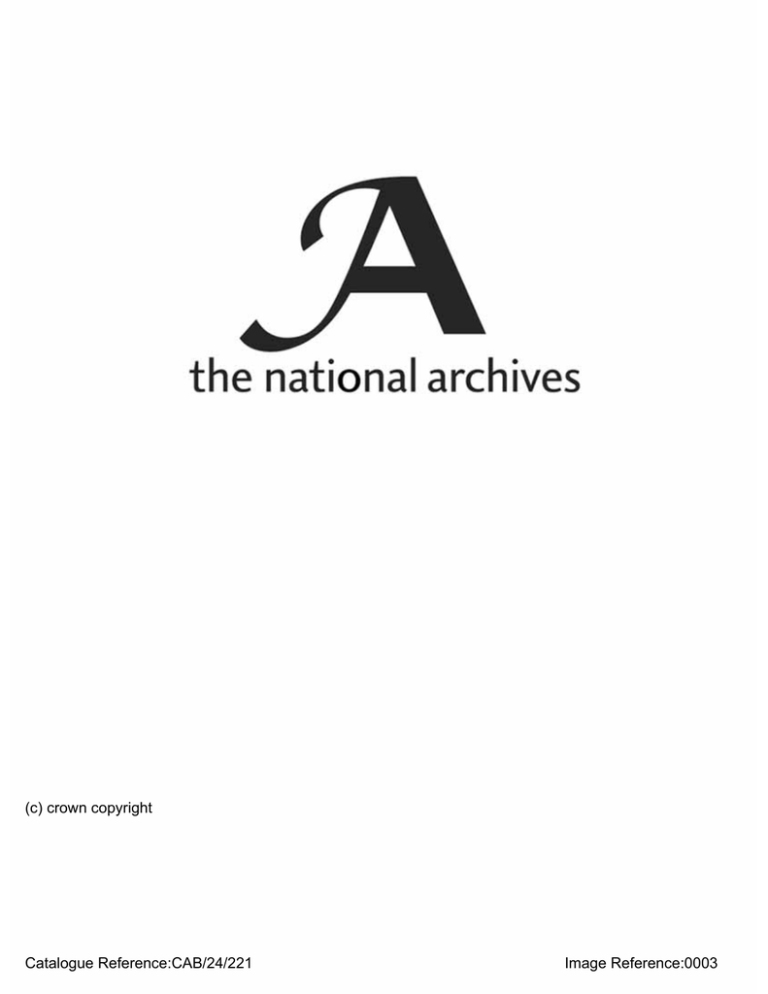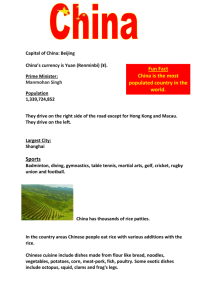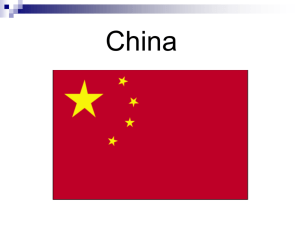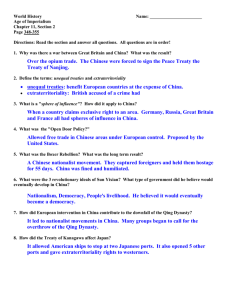(c) crown copyright Catalogue Reference:CAB/24/221 Image Reference:0003
advertisement

(c) crown copyright Catalogue Reference:CAB/24/221 Image Reference:0003 fiJTOCtflvEiiNT IS THE PROPERTY OF HI3 BRITANNIC MAJESTY 3 GOVERNMENT) 1 egret. Copy No. LP. 158 (51) C A B I N E T NEGOTIATIONS WITH THE . CHINEE GOVERIMBNT FOR THE ABOLITION OF EXTRATERRITORIAITTY. Memorandum by the Secretary, of State for Foreign Affairs. FOREIGN OFFICE. June 2nd, 1931. MEMORANDUM BY THE SECRETARY OF STATE FOR FOREIGN AFFAIRS. Extrat err it oriality Negotiat ions. 1. Since the date of the Cabinet decision on my memorandum of April 27th the negotiations with the Chinese Government have proceeded. They have now reached a crucial point. 2, I recall once more the fact that the policy which I have pursued with the assent of my colleagues is the logical result of the late Government's memorandum of December 1926; the position which we have reached is the inevitable one in view of the determination and ambitions of the Chinese Government as revealed in the negotiations and by other events. 3. The whole Treaty has now been negotiated with the exception of two points, namely:­ (a) Duration. (b) Reserved Areas. 4. Sir M. Lampson has assured us that it is futile to expect that the Chinese will ever sign a treaty, such as the one now negotiated, if it is to be perpetual. Their chief grievance against the present so-called un­ equal treaties is that they purport to bind the Chinese in perpetuity and the Chinese will never submit to such a situation again. Sir M. Lampson has therefore concen­ trated on securing agreement that the Treaty shall be in force for ten years when the Chinese, should they so desire, will be at liberty to terminate it. 5. The Treaty provides for the establishment of special chambers for the trial of cases involving British subjects and for the appointment of foreign Legal Counsellors to exercise certain important func­ tions (but not the functions of a oo-judge) in these chambers. Sir M. Lampson has agreed that even though the duration of the Treaty may be for ten years or longer the Chinese should not be bound to maintain these special chambers and legal counsellors for longer than five years. 6. The remaining articles of the Treaty contain a variety of safeguards which we should like to see made permanent. The chief of these safeguards (arranged roughly in order of importance) relate to (a) Arrests, imprisonment and bail. (b) Taxation. (c) Shipping. (d) Expropriation, immunity of premises and of commercial books and correspondence. (e) Forced loans. (f) Companies. (g) Lawyers and interpreters. (h) Commercial Arbitration, 7. If these safeguards are not made permanent, then when the Treaty is terminated British subjects will be subject to Chinese jurisdiction without any safeguards whatever, subject however to three quali­ fications, namely:­ (l) It should be possible to secure substantially safeguards (b) to (f) in the commercial treaty which it is proposed to negotiate at an early date. We may not however..... however get quite such satisfactory terms, since we cannot give complete reciprocity to which the Chinese, for purposes of "face", attach great importance. (2) We propose in any case to insist that an article of the Treaty (No.18) shall he made perpetual, under whioh British subjects would then enjoy in per­ petuity "all exemptions from Chinese jurisdiction which may be enjoyed by the nationals of any other country and shall be subjected to no discriminatory treatment in respect of taxation, judicial or any other matters for which this Treaty provides, as compared with the nationals of any other country..-. This would be of great value r The Germans, for example, who lost their extraterritorial rights in the war found no difficulty in 1924 in securing the consent of the Chinese that Germans should be subject only to the jurisdiction of the Modern Courts and be entitled to employ German lawyers and interpreters, (3) any of the safeguards in paragraph 4 above M v/ould be secured by the provisions of Chinese law. Although this is not much protection for a Chinese it would be protection for a British subject, backed by diplomatic representations. 8. In view of Sir M. Lampson's definite state­ ment that the Chinese will never agree to indefinite continuance of the Treaty, I feel that it will be wise to accept the time limits (which Sir M.Lampson has only been able to obtain aft or keen argument) of ten years for the duration of the Treaty as a whole, with five years for the special arrangements relating to Special Courts and Legal Counsellors, together with perpetuity.. . 0 perpetuity for the most-favoured-nation treatment described in Article 18. 9, As regards reserved areas, we have "been prepared to limit our demand to Greater Shanghai and Tientsin -provided every other point is settled to our satisfaction. 10, The point in dispute with regard to the reserved areas is whether British subjects in these areas are to pass automatically under Chinese juris­ dictlons after a fixed period or whether the transfer of jurisdiction should take place only in accordance with special arrangements agreed to after due nego­ tiation. The objections to a fixed time limit set out in the following paragraphs apply particularly to Shanghai, but similar considerations, in somewhat lesser degree, apply also to Tientsin. 11. Considering the vast concentration of foreign interests in Shanghai, it does not seem desirable that British subjects in that area should be transferred to Chinese jurisdiction unless arrangements have been made for a prolonged period during which they would have the protection of special safeguards. The safeguards for Shanghai may perhaps be even more important than the . safeguards for the rest of China incorporated in the Treaty now under negotiation. Practical experience of the working of this Treaty would provide a useful guide as to the safeguards necessary for Shanghai. But if there were a fixed time limit for Shanghai then (a) there would be little incentive to the Chinese to make the Treaty now under negotiation work successfully (b) it may eventually prove impossible to secure the consent. consent of the Chinese to safeguards for Shanghai which may be deemed to he absolutely essential. 12. Sir M c Lampson has secured an offer of the exclusion of greater Shanghai for ten years after which British subjects would automatically pass under Chinese jurisdiction. This is a very tempting offer.. Ten years, however, is also the period for the duration of the Treaty c The effect would therefore he that after ten years British subjects would at one blow pass under Chinese jurisdiction without any preliminary period of special chambers, legal I counsellors and the other safeguards specified in para­ graph 4 above (except in so far as the latter are secured I in a commercial treaty). 13. I If the safeguards in the proposed Treaty wore made perpetual some of the objections to a fixed time limit, for Shanghai would be removed. Sir M, Lampson has how­ ever already agreed that special chambers and legal counsellors may be abolished after five years and these are safeguards which it is essential to secure for Shanghai. Moreover, additional safeguards of a different character will be required at Shanghai in order to pre­ vent the collapse of the municipal administration of the Settlement on the transfer of jurisdiction. 14 e These arguments against accepting a fixed time limit for the exclusion of Shanghai from the operation of the Treaty have been fully expounded in a telegram to Sir Mo Lampson, Sir M . Lampson was Instructed to I consult the Consul-General and the leading members of th-- I British community at Shanghai, taking into consider at ix: also any recommendation as to the future of Shanghai 1 which..,. c *j 3 e) which might have been made "by Mr. Justice Feethanu From the replies which have now been received it appears that the leaders of the Shanghai community, the Consul-General at Shanghai and Sir M.Lampson are all agreed in thinking that the Chinese offer should be accepted as it stands. Judge Feetham, on the other hand, holds the view that was put to Sir M. Lampson in detail by the Foreign Office telegram namely, that a fixed time limit ties a rope round the neck of the Settlement. After full consideration Sir M. Lampson is of opinion that this argument under­ estimates the strength of the political forces at work in China. No Chinese Government will agree to an in ­ determinate period for Shanghai and the Chinese may at any time initiate a process which would make the position of the Shanghai Municipal Council untenable. Therefore exclusion for a period of ten years - in spite of the obvious objections to a fixed time limit - is the most favourable settlement that we can hope to secure. 15. It is a difficult problem, but as between Judge Feetham on one side and our Minister, ConsulGeneral and leading merchants on the other, we should be guided by the views of the latter rather than the former, especially when it is a case of estimating the strength of Chinese political forces. This is a matter in regard to which the opinion of Judge Feetham, for all his great ability, is not likely to be of great value. It is possible that in seeking a solution of the... the Shanghai problem Judge Feet ham has set "before himself ail ideal of local self-government, which, had he been better acquainted with the workings of the Chinese mind, he would have known was unattainable. 16. The Chinese Minister for Foreign Affairs has made it plain that he is not in a position actually to sign the Treaty at this moment in view of the political situation in China and the revolt of the Cantonese who would, he fears, use his offer regarding Shanghai as a weapon against the Nanking Government. He is however 9 3 ready to agree on the text, as between himself and Sir M. Lampson for the consideration of the Chinese Government and His Majesty's Government. If this course is author­ ised we shall not be committed finally and we shall have the advantage of having reached a complete agreement with the Chinese Minister for Foreign Affairs and shall be in a strong position to hold the Chinese Government to the terms negotiated with him. The only obstacle to implementing the Treaty would be China's own domestic difficulties and not any hanging back on our part. At the same time, apart from the opportunity of careful consideration before signing the Treaty, it will still be possible to make minor amend­ ments in the agreed texts and to take advantage of any im­ provement in the terms of the Treaty that may be secured by other powers in their own negotiations. 17, The position which I therefore suggest should be reached is that Sir M Lampsen should be authorised to ex­ e change letters with Dr. Wang agreeing as between themselves on the text of the Treaty as negotiated and reserving it for confirmation by the Chinese Government and His Mais£ty's Governments. A draft telegram is attached, together with a oopy of Sir M. Lamps on's telegram to which it refers,, irt ANNEX 1. Draft telegram to Sir IvL Lampson (Nankins:). You are authorised to exchange agreed copies of whole treaty and attached documents under cover of letters as in your telegram No. 241. Words "to London" should however he omitted and "His Majesty's Government" should be replaced by "His Majesty's Governments.". it is of course to be understood that if text is ultimately accepted minor amendments will be possible if found necessary for drafting or constitutional reasons between now and time of signature. A (" Prom CHINA. Telegram (en clair) from Sir M. Lampson (Nanking), D. 29th May, 1931. R. 9.00 a.m. 29th May, 1931. Mo. 241. Tour. Sir Miles Lampson to Doctor C.T. Wang. My clear Doctor Wang, With reference to our recent conversations I should he glad to receive your confirma­ tion that the draft treaty in all twenty two-articles, and attached documents marked " A " to "I" concerning the readjustment of matters relating to jurisdiction over subjects of His Majesty in China, copies of which were exchanged between us today and which I am now referring to London for confirmation of His Majesty's Government, are acceptable to you as they are to me. Doctor C . T . Wang to Sir Miles Lampson. My dear Sir Miles Lampson, In reply to your letter of today's date on the subject of the draft treaty in twenty two articles, preamble, and attached documents marked "A" to "I", relating to jurisdiction over subjects of His Majesty in China, copies of which were exchanged between us today, I have the honour to inform you that the said draft treaty and attached documents are acceptable to me and are being submitted to my government for confirmation. Addressed to Foreign Office No. 241, repeated to Peking and Shanghai.



